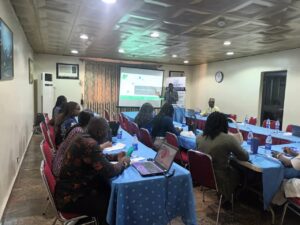Spaces for Change | S4C partnered with the Centre for Information and Technology and Development (CITAD) to facilitate a three-day training session aimed at enhancing the capacity of the National Human Rights Commission (NHRC) to safeguard digital rights in Nigeria. Held from July 18 to 20, 2023, in Abuja, Nigeria, the training workshop focused on empowering NHRC staff to incorporate the promotion and protection of digital rights into their statutory mandate of human rights protection and enforcement. As emerging digital technologies increasingly aid human activities to migrate to virtual spaces, the ability of citizens to freely work, express themselves, and organize online has become essential. Digital rights, therefore, encompass all the necessary guarantees and entitlements that enable citizens to undertake social, economic, political, cultural, and professional activities online, without hindrance and harm, either by state or non-state actors. Building the NHRC’s capacity to enforce these guarantees is crucial for creating a conducive legal environment for the full enjoyment of digital rights in Nigeria.
During the workshop, S4C presented the organization’s research findings which showed a concerning decline in the civic space, with free speech and internet freedoms severely impacted. Research findings further reveal how massive budgetary allocations and spyware technologies procured in the name of counterterrorism and curbing insecurity have been diverted to curtail civic participation and obstruct online spaces where civic actors organize and associate. Cyberbullying, re-characterization of dissent as terrorism, hacking, intrusive data collection, arbitrary surveillance, criminal prosecution based on cyberstalking provisions of the Cybercrimes Act, interception of private communications, etc. are some of the documented modes of attack on civic actors. These findings underscore the NHRC’s critical role in extending its protective vigilance to human rights in the online sphere.
While the newly-passed Data Protection Act 2023 addressed some of the concerns raised in S4C’s research studies, heavy gaps remain. The presentations by other facilitators at the training workshop addressed important topics such as digital identity, data privacy, child protection in online spaces, and the gendered impact of online harms. The facilitators—comprising experts from civil society organizations (CSOs), media practitioners, independent subject matter experts, academics, and representatives from regulatory agencies such as the Nigerian Information and Technology Development Agency (NITDA) and Nigeria Identity Management Commission (NIMC)—shared global and regional perspectives on digital rights protection, while emphasizing the need for NHRC to deploy technological tools and resources to enhance its human rights monitoring, protection and enforcement capabilities.
Established in 1995 in compliance with the African Charter on Human and Peoples Rights and relevant United Nations instruments, the NHRC is an independent agency of government and an extrajudicial mechanism responsible for promoting and protecting human rights in Nigeria. The Commission monitors human rights violations and assists victims in seeking redress. In 2010, the NHRC’s powers were amended to include quasi-judicial powers, allowing it to summon individuals, gather evidence, award compensation, and enforce decisions. The Commission formulates the Nigerian Government’s human rights policies and has been instrumental in ensuring justice for victims of human rights violations and police brutality in Nigeria.





















